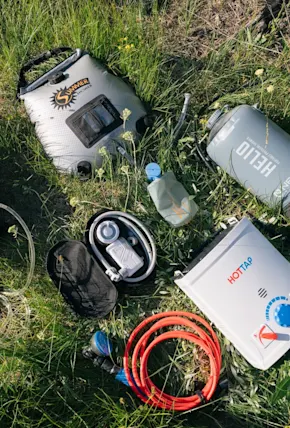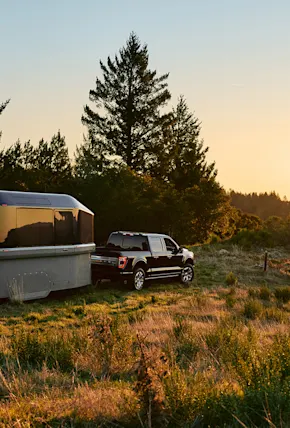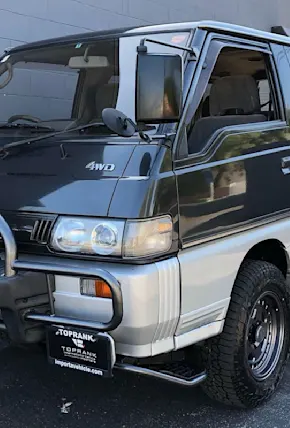Model: 1971 Van
This bright van had a long life as a haole before being brought to O’ahu by Hawaii Surf Campers (HSC) in January. Once on the island, the company (which has a separate conversion business for those already with a van) cleaned up the interior, lightened up the exterior green paint, and made several other adjustments that are pretty standard when getting an early '70s Bus seaworthy—err roadworthy—again. The van has relatively low wear given Hawaii’s recent travel restrictions and HSC hopes to get her back on the road soon.
Now that you've browsed the listings and decided what you like and don't like, we'll dig into a few more broad but important questions on the mind of many looking for a VW camper van in the USA or abroad.
Are VW camper vans worth the money?
Good question. And a tough one to answer, as "worth" is entirely subjective when it comes to dealing with older vehicles. Doing a road trip or camping trip in a VW camper van is all about the journey, the adventure, really. Because there are a limited number of VW camper vans available for rent, a well-maintained van could cost the same (if not slightly more) than a hotel room. Still, renting a camper van gives you the freedom and flexibility to make your home for the night wherever you find yourself on the road.
Keep in mind that, due to age and the boxy shape of classic VW camper vans, they have a lower gas mileage than more modern vehicles. Most VW busses’ gas mileage is around 15 to 20 miles per gallon. This will need to be calculated into your daily budget.
Because most VW camper vans sleep four people (snuggly), there are more people to split the cost–and make memories in these unique and popular vans.
The difference between a camper van and a motor home
Both camper vans and motor homes are classified as RV’s (recreational vehicles—bet you didn't realize that's what RV stood for). This term refers to a motorized vehicle that is used for camping, and other general exploration.
Camper vans are generally smaller than motor homes. This could mean that you need to crouch down when moving around inside. However, some campers have been modified with roofs that pop up to provide more height and extra headroom while you are parked.
One of the significant differences between a camper van and a motor home is the absence of shower and toilet facilities in a Volkswagen camper van.
Because they are smaller, camper vans may feel a bit cramped, especially if you are a group of adults traveling together. But they can often go where RV's can't. Camper vans can sleep between two and four people on one or two double beds, while motor homes can accommodate a combination of single and double beds for between two and six persons, or more. Keep in mind that even the best VW camper vans will have less space than the smallest motorhomes. That means your sleeping space will double as a kitchen and lounge area. Still, some have roof racks or pop tops where you can store some of your gear or sleep at night.
Motor homes usually have a long wheelbase. While this gives you more room, it also means you are likely to pay higher toll fees and ferry charges, not to mention find a worse turning radius and off-road terrain more difficult to traverse.

Photography by Nash Rood
Can you rent a VW bus?
Yes, c'mon. Scroll back above! But fr, you don’t need to buy this iconic camper van to go on an adventure in one. Instead, you can rent a VW bus and take to the road. Since Volkswagen vans are no longer produced, there is a limited amount available for rent. Still, numerous companies across the U.S. rent out VW camper vans for outdoor enthusiasts and adventurers to take on the road.
Many VW campervans (especially those produced before 1973) have manual transmissions (aka stick shift), and rental companies may require the driver to have experience driving this type of vehicle.
These Volkswagen vans are considered to be vintage vehicles that require considerable amounts of maintenance (not to mention the initial restoration). For this reason, many rental companies have strict limits on the number of miles that you can drive each day. In some cases, the rental company may also set a limit on continuous drive time.
Volkswagen campervan rental companies will likely require you to have full cover on your current car insurance. They may also request a security deposit and place a hold on your credit card to cover any damages that may occur to this iconic camper van.
How much does it cost to rent a Volkswagen camper?
Renting a VW camper could cost anywhere between $130 and $350 per night. Many van rental companies have a minimum rental period – usually 3 nights. Some companies offer discounted rates for longer rentals. You may also find that rates change according to season, similar to hotel rates.
Some camper van rental companies may charge an additional relocation fee if you drop the van off at a different depot from where you collected it. Planning your route to collect and drop off your rented Volkswagen camper van at the same depot can save you from paying a relocation fee.
Similarly, there may be extra fees involved if you collect or return your rented van on a Sunday. You may also need to pay a cleaning fee, so check the fine print carefully before booking your VW campervan.
You may need to pay for insurance or risk a high excess in the event of an accident. This may be covered under your current insurance, so be sure to check before you head out.
Remember that you will need to pay local and state taxes on your Volkswagen campervan hire. This will be calculated upon checkout (or where you enter your payment details if you are renting a van online).


















